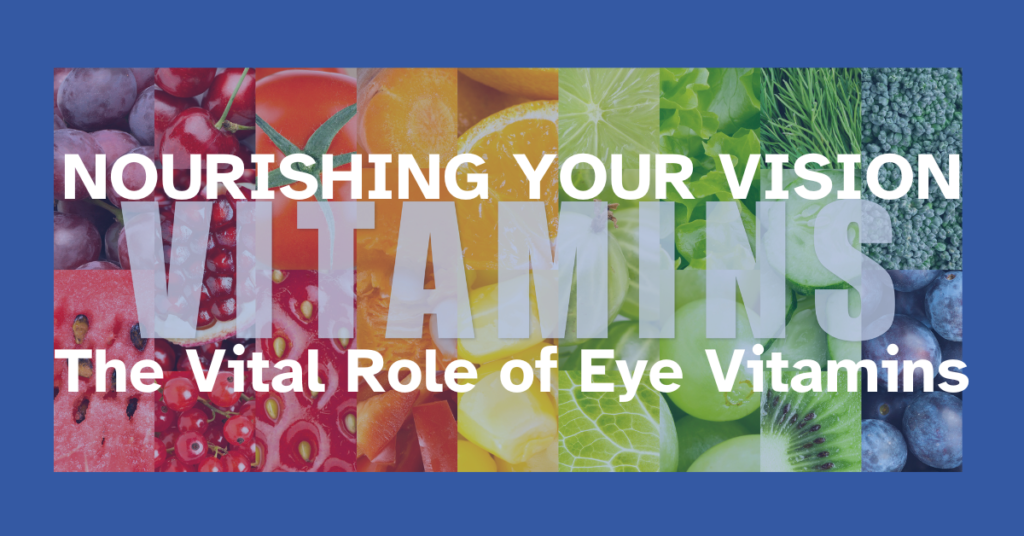A key component of preserving eye health is ensuring you get the right vitamins and nutrients in your diet. The Age-Related Eye Disease Study (AREDS) and AREDS2 study by the National Eye Institute have highlighted the remarkable impact that eye vitamins can have, especially in cases of high-risk macular degeneration. Let’s delve into the importance of eye vitamins and their role in age-related macular degeneration (AMD) and look at the “Big Three” options for eye vitamin supplements – Ocuvite, PreserVision AREDS II, and TOZAL.

The Growing Concern of AMD:
Age-related macular degeneration is a serious eye condition that affects more than 11 million people in the United States, and this number is projected to double by 2050. The good news is that studies have shown that using eye vitamins can help slow the progression of AMD in many people, offering hope for those affected by this condition.
Exploring Your Eye Vitamin Options:
1. Ocuvite Vitamins: The Fight Against Macular Degeneration
Ocuvite vitamins have been recognized for their ability to prevent the development of macular degeneration. The clinical trial conducted by the National Eye Institute affirmed the effectiveness of these vitamins.
2. PreserVision AREDS II Eye Vitamins: A Shield for Macular Health
For those concerned about the aging process affecting their eyes, PreserVision AREDS II eye vitamins are also highly recommended. These supplements have proven beneficial in maintaining macular health over time, as confirmed by clinical trials.
3. TOZAL: Going Beyond Standard Recommendations
TOZAL softgels take it a step further by surpassing the recommendations of the AREDS I and II studies. This comprehensive supplement is designed to support eye health and is particularly beneficial for those at risk of age-related macular degeneration.
The Significance of Clinical Trials
The Age-Related Eye Disease Study (AREDS), sponsored by the National Eye Institute, played a pivotal role in shedding light on the importance of vitamin supplements in preventing macular degeneration. This extensive study revealed that high-risk individuals who took vitamin supplements containing Vitamin C, Beta-carotene, Vitamin E, and zinc reduced their risk of advanced-stage AMD by 25%. Even those with only one eye affected by intermediate to advanced AMD saw a 19% decrease in the risk of vision loss. However, individuals with no early signs of AMD did not experience any benefits from taking the supplements.
The Age-Related Eye Disease Study 2 (AREDS II) built upon the foundation of the original AREDS study to further investigate the effects of supplements on age-related macular degeneration (AMD) and brought some noteworthy differences and findings compared to the original AREDS study:
-
Beta-Carotene Replacement: One significant difference was the replacement of beta-carotene with lutein and zeaxanthin in the AREDS II formula. This change was made because beta-carotene, which was included in the original AREDS study, had been found to have potential risks for current or former smokers. Lutein and zeaxanthin are carotenoids that are considered safer alternatives.
-
Omega-3 Fatty Acids: AREDS II included omega-3 fatty acids, specifically docosahexaenoic acid (DHA) and eicosapentaenoic acid (EPA), not part of the original AREDS formula. These fatty acids were believed to have potential benefits in preserving macular health.
-
Effect on Cataracts: While the original AREDS study primarily focused on AMD, AREDS II expanded its scope to assess the impact of the supplements on cataract development and progression. It found that the AREDS supplement did not reduce the risk of cataracts but still provided valuable insights into this common eye condition.
-
Refinement of Supplement Dosages: AREDS II further fine-tuned the dosages of vitamins and minerals used in the supplements. It tested variations of the original AREDS formula to determine the most effective combination and levels of these nutrients for eye health.
-
Genetic Factors: AREDS II also examined whether genetic factors affected how individuals responded to the supplements. It investigated whether a person’s genetic makeup influenced the effectiveness of the vitamins and minerals in preventing advanced AMD.
A Smarter Approach
PreserVision AREDS II, Ocuvite, and TOZAL are three viable options for individuals with early to advanced AMD. PreserVision AREDS II, in particular, stands out by replacing beta-carotene with Lutein and Zeaxanthin, making it suitable for smokers. This supplement contains a blend of Lutein, Zeaxanthin, and Omega-3 fatty acids, vital for maintaining macular health as you age.
Our patients can talk to Dr. Kornfeld to determine the most suitable eye vitamin supplement for them. Regular eye check-ups are also essential to monitor your vision as you age. While changes in eyesight are inevitable, taking proactive measures can help you maintain a high-quality, independent lifestyle and prevent low vision diseases.
To learn more about your options and receive a free phone consultation, don’t hesitate to contact us today (585) 271-7320. Your vision is worth preserving, and eye vitamins can be a vital part of that journey.
